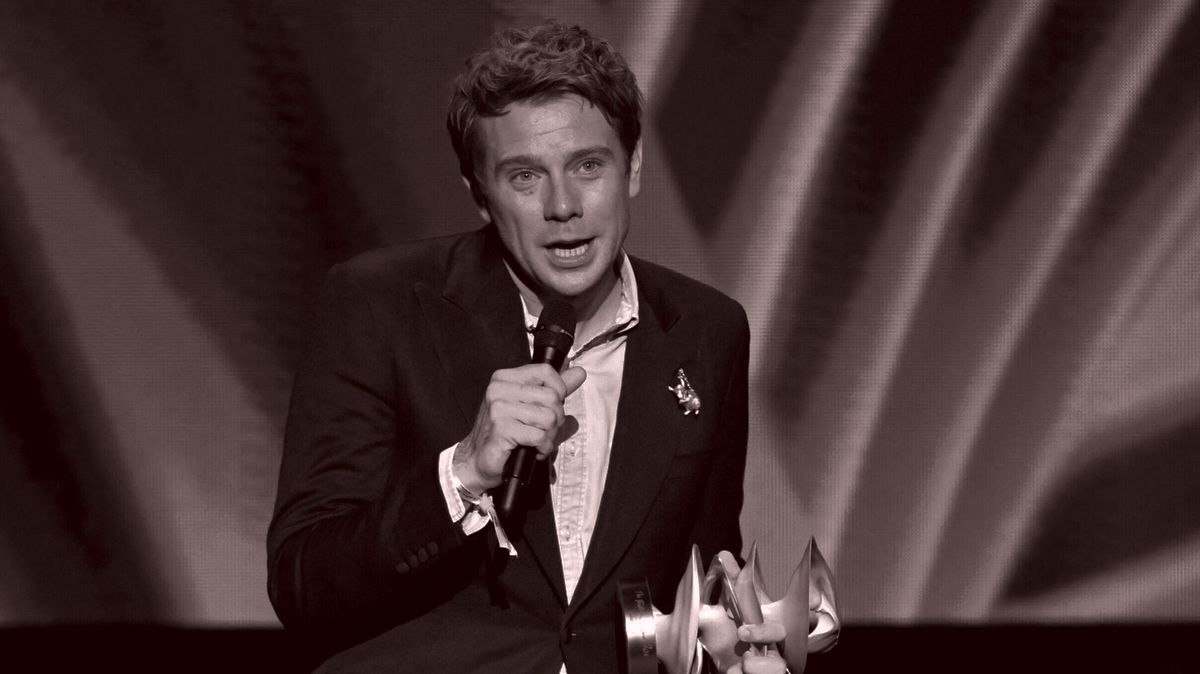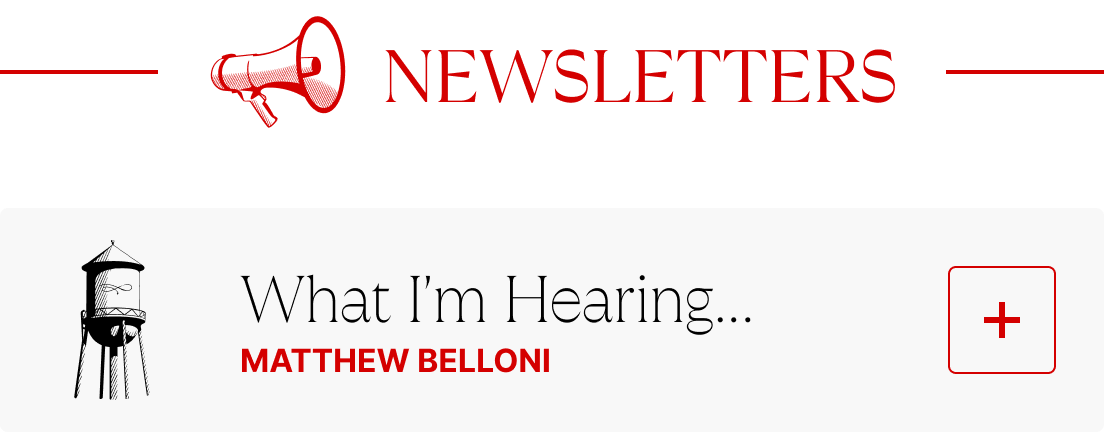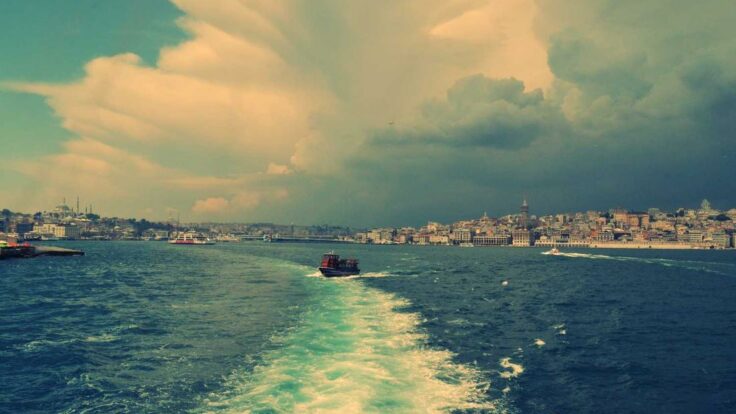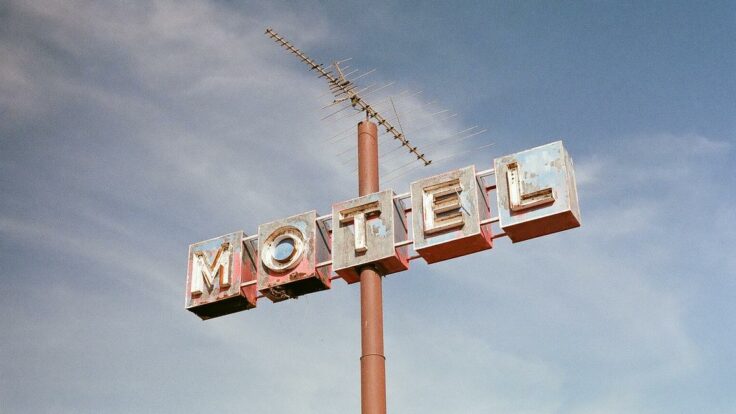Hi, and welcome to Line Sheet, coming at you from the desert,
where a good moisturizer only gets you so far.
We’re ducking out on New Year’s Day, but I’ll be back on January 2 with a look at what’s ahead in 2025. Until then, enjoy this conversation with costume designers Jonathan W. Anderson and Virginie Montel, which took place at Puck’s Stories of the Season event in November. (They were subsequently nominated for
Costume Designers Guild awards, by the way.)
Up top, I’m capping off last week’s mailbag issue with additional questions concerning everything from the Prada–Lure Fishbar–Peter Brant situation to the state of indie magazine funding. (We’re all
in some sort of state, right?)
🚨🚨 Programming note: Tomorrow on Fashion People, I’m joined by Marisa Meltzer (journalist, book writer, and author of Soft Power, a newly launched beauty Substack) to reflect on some of the biggest fashion and beauty stories of the the
past year. We mixed things up to satisfy all types. Listen here and here.
Mentioned in this issue: Jonathan W. Anderson, Virginie
Montel, Janty Yates, Colleen Atwood, Prada, Lure Fishbar, Emily Sundberg, Selena Gomez, Zoe Saldaña, The Row, Thom Browne, Daniel Craig, Drew Starkey, Gabriela Hearst, Langosteria, NYFW, Bernard Arnault, Blake Lively, Justin Baldoni, and many
more…
|
Mailbag Overflow: Answers to
Three Things You Asked…
|
Any intel or thoughts on the Prada-Lure
situation?
I have so many thoughts, but to summarize: Lure Fishbar, the basement restaurant on the corner of Mercer and Prince, might have to close at some point because Peter Brant, the Warhol benefactor and paper magnate and owner of the building,
is rumored to be selling the space to his other tenant, Prada—and Prada may want to open a café of its own. Whether or not Prada is opening its own café is pure speculation at the
moment, but that never stopped anyone in this industry. I’m told by a source close to John McDonald, Lure’s owner, that he first heard the rumor in Feed Me, Emily Sundberg’s daily newsletter, and that McDonald has not been contacted by the building’s owner. Nothing, absolutely nothing, has been confirmed.
Still, we can speculate a bit.
Remember that the group that owns Prada also owns Italy’s Marchesi patisserie—maker of chocolates, cookies, and yes, panettone. They have multiple locations in Milan. Would it make sense for Prada to open a café in that building? Sure: The SoHo location is one of its most visited stores in the world. Is it a bummer that Lure may be forced to close or move, a costly and potentially business-ruining endeavor? Yes. McDonald, the former publisher of City magazine (remember it?),
has played a big role in shaping the culture of the neighborhood over the past 30 years. Preston Clark, the chef, is Manhattan food royalty. (His dad, the late Patrick Clark, made his name at Odeon and Cafe Luxembourg.) It would be sad to see it relocate from that cozy, reliable outpost.
That said, Lure was able to thrive in SoHo because stores like Prada existed. And more
symbiosis between hospitality and fashion businesses is simply the latest evolution of the luxury market. (Louis Vuitton just opened a café uptown; Gucci has partnered with Italy’s most famous chef, Massimo Bottura, on restaurants; Moncler’s Remo Ruffini co-owns everyone’s favorite Milan spot, Langosteria.) In the end, I’m a fan of restaurant diversity, and have always enjoyed Lure, where there’s lots of wood paneling and wine being served at
lunch, not to mention totally acceptable sushi rolls. Here’s hoping they can all work it out.
|
|
|
A MESSAGE FROM OUR SPONSOR
|
Zoe Saldaña, Selena Gomez, Karla Sofía Gascón, and Director Jacques Audiard break down the
unique music that is the backbone of EMILIA PÉREZ.
—
|
EXPLORE THE PROVOCATIVE WORLD OF EMILIA PÉREZ
|
|
|
When a non-French brand decides to show in Paris—like
Gabriela Hearst, Victoria Beckham, Thom Browne, and The Row have done—is it difficult to get approval from the organizing body? And if Gabriela Hearst were to bring her show back to New York, would it create an awkward situation for the brand?
Yes, it’s fairly difficult to get on the official schedule—France’s fashion industry is not a democracy—but the people who run the Fédération de la Haute Couture et de la
Mode are pretty great, and will do what they can to make it work. The harder part is that you’re typically not given the most desirable time slot. (The Row got lucky with its Wednesday, mid-morning showing.) Also, Paris Fashion Week is the busiest of them all, and it’s harder to get noticed.
I don’t think there would be any awkwardness if Hearst were to go back to New York. Thom Browne toggles between Paris and New York. Altuzarra went back to New York, and so did Proenza Schouler, and
folks were thrilled. You just have to do your sales in Paris. If anything, being on the New York Fashion Week schedule affords a brand more attention, earlier in the seasonal cycle.
I’m always curious about those B-tier fashion magazines that seem to run exclusively on big editorials of up-and-comers. Wonderland comes to mind, but also Man About Town,
Polyester, V magazine, etcetera. How do these magazines stay in business?
Beats me! Just kidding. To start, every entity is unique, and people at these magazines tend to grind. But here are some other ways they typically stay afloat. One is that they are run very lean; they often don’t pay contributors, or
even staffers—but instead provide a platform for ideas that wouldn’t be published elsewhere. Secondly, advertisers like these types of publications because they are brand-safe, target the right young-and-affluent audience, and have lower rate cards than publications with larger circulations. So you can make a business out of it, albeit a small one. Also, most of these types of magazines are in debt. And finally, there’s often a rich investor, or a rich founder, who
puts up some of their own money to back it.
And now, the main event…
|
|
|
Paris and Hollywood might be thousands of miles apart, but they’ve
never needed each other more. CDGA-nominated wunderkinds Jonathan W. Anderson and Virginie Montel discuss how the worlds of fashion and entertainment are merging, from Saint Laurent Productions’ involvement in Emilia Pérez to how an LVMH designer ends up making costumes for Luca Guadagnino.
|
|
|
Before the holidays, Puck hosted
Stories of the Season, our inaugural, atypical riff on for-your-consideration fodder, where I interviewed four of the film industry’s most compelling costume designers:
Jonathan W. Anderson (Challengers and Queer), Virginie Montel (Emilia Pérez), Janty Yates (Gladiator II), and Colleen Atwood (Beetlejuice Beetlejuice). Not only were they all recently nominated for Costume Designers Guild Awards, but Yates was also recently nominated for a Critics Choice Award.
The lightly edited and condensed excerpt I’ve shared includes insights
from Montel—who collaborated with Saint Laurent designer and Emilia Pérez producer Anthony Vaccarello on a selection of costumes. It’s also heavy on J.W.A. for obvious reasons: He’s a Line Sheet superstar, had a huge 2024, and is set to have an even more transformational 2025. (I’m not simply reading the tea leaves here; we know change is afoot, whether or not it
concerns Dior.)
You’ll see from this conversation that Anderson is quite serious about his work designing the costumes for not one, but two Luca Guadagnino films, which were both released this year. (He’s also rumored to be attached to
Guadagnino’s upcoming adaptation of American Psycho, set to star Austin Butler.) And the CDGA nom is no small feat: It means his work is being recognized by his new, very discerning colleagues.
|
The Runway vs. The Screen
|
Lauren Sherman: Virginie, you’ve
been working with Emilia Pérez director Jacques Audiard since you were kids. With this film, you were also the artistic director. In the end, Saint Laurent Productions joined as producers.
Virginie Montel: Saint Laurent came quite late on the production part, and we had made a lot of works because musicals are very based on the work of everybody—the choreography, the dancing, the
singing, the sets, and the costumes all go together. We already had quite a strong idea of the colors, of the design, and of the costume. We also worked with Anthony’s most recent collection, they made some really nice stuff for Selena [Gomez] and Zoe [Saldaña].
|
|
|
A MESSAGE FROM OUR SPONSOR
|
Zoe Saldaña, Selena Gomez, Karla Sofía Gascón, and Director Jacques Audiard break down the
unique music that is the backbone of EMILIA PÉREZ.
—
|
EXPLORE THE PROVOCATIVE WORLD OF EMILIA PÉREZ
|
|
|
Have you ever had that kind of experience before, where
you were commissioning an outside designer?
Montel: No, it was the first time. I think it’s quite new in the industry that fashion [companies] come to be interested in production and in costume.
Jonathan, how did you link up with Challengers and
Queer director Luca Guadagnino, and how do you approach designing for film versus designing a ready-to-wear collection?
Jonathan Anderson: I met Luca maybe 10 years ago at a hotel in Milan. We were introduced by a P.R., and what was supposed to be a 30-minute coffee meeting ended up being a dinner that went on to the early hours, talking and
talking about art. And we’ve always been trying to figure out how to work together. And when the pandemic happened, Luca approached me near the end of it, and said, Would you be up for doing costumes in a film? And I think because of the pandemic, I was worried that I wasn’t going to have a job. No one was buying luxury goods at that point. So I was like, Sure, why not? And about five weeks later, I was on a plane to Boston to go and shoot this film. He’s like a dear friend. We
get on very well; he’s someone I speak with every day and whom I trust. Even in my own day job and in film, we have similar opinions on the way we see the world.
Regarding how my approach differs—when I do a fashion show, you have to tell a story in 15 minutes. We build a giant mausoleum for it, and then we tear it all down. It’s sort of this very fast process, but at the same time, you’re trying to tell a story in each
season. For me, psychology and storytelling, ultimately, is how they both link.
|
For Queer, you
sourced pieces from that era. How did you go about doing that? And why did you choose to do that instead of making pieces?
Anderson: When I was reading the script, I felt with [William S.] Burroughs that there is a kind of heavy psychological narrative there. And ultimately, you’re trying to work out what’s real and what’s not real in the book. What is
drugs? What is not drugs? What is love? What is not love? And when I was looking at the storyboarding with Luca, I could see that everything else was going to be moving around it in a non-time-period sense. It was all shot on a stage. It was not on location. So I felt like the clothing needed to capture the period’s reality—for me, when working with Daniel [Craig] and Drew [Starkey] and the rest
of the castmembers, I wanted this idea that they would all have suitcases, or they would have the items behind stage where they would keep the clothing in the evening. So it was just one garment; there were no duplicates made. It was this idea that it is all from the time period. The underwear was from the period, the socks were from the period… which I think, for me, helped to kind of have this feeling that there is another world within the book.
You could find underwear?
Anderson: Yeah, I found a crazy guy in Montreal who was collecting underwear for other reasons. This guy had underwear dating back to the 1830s. It was very interesting. You realize that elastic doesn’t become very commonly used until at the end, after the war.
|
|
|
How much designing and sketching did you do for
Challengers?
Anderson: A lot, because I was dealing with big brands and not actually taking endorsements from them. We had to make a lot of it, because some of the pieces are obviously from the early 2000s, so we couldn’t source enough. So I ended up making 40 of each for those tennis scenes, which went on for days. There was a lot of
replicating things that already existed, and dealing with the bureaucracy of the big brands, discerning who was going to dress the winner. It’s a weird world in sports.
In fashion, we talk a lot about the “hero piece.” I wanted to know what you all think is the hero look from your film that really helps tell the story of the film.
Montel: In Emilia Pérez, I think the red suit is iconic now, and fabulous. It was a Saint Laurent suit. We started with a black one, and then we asked for a red one.
Anderson: I love Allerton’s character [in Queer]. It was played by Drew, and he’s wearing these translucent shirts. I think for me, it was a way to bridge the idea of the reality and the
nonreality—this idea of the translucency through to the body, the cigarette pack inside the pocket, and the flesh underneath. It’s referring to the morphing that’s in the book. It was like trickery without special effects.
|
What I’m Reading… And Listening To…
|
LVMH’s stock might be down 13 percent this year, but
Bernard Arnault and his family still topped Forbes’s end-of-year Billionaires List, with an estimated net worth of $233 billion, up from $211 billion in 2023. Boy, did I hit the jackpot when I decided to cover fashion-as-a-business all the way back in 2006. [Forbes]
Another
Arnault deputy threw a goodbye party for himself. Moët Hennessy global distribution head Jean-Marc Lacave, who joined the business in 2001, bid adieu on December 16 with a “sumptuous” party on the top-floor lounge of the wine-and-spirits division’s headquarters. Lacave and his C.E.O., Philippe Schaus, are exiting the business as middle-child Alexandre and Jean-Jacques Guiony
swoop in as co-C.E.O.s of the struggling division. [La Lettre]
I cannot think of one fashion publicist capable of engaging in the type of warfare between all these flacks mixed up in the Blake Lively–Justin Baldoni drama. (Okay, maybe one.) Puck’s legal correspondent, Eriq Gardner, breaks down what is arguably the most compelling battle here: between Stephanie Jones and her former
employee, Jennifer Abel. [Puck]
If you’re interested in exploring the generational divide between people who look good in chinos, people who are comfortable discussing Luigi Mangione’s fashion choices and online dating presence,
and people who have read Glamorama, be sure to check out this A-plus conversation between Mel Ottenberg, Chris Black, and Jason Stewart. [How Long Gone]
Two more podcasts for
my particular breed of dork: One is an oral history of Mars Incorporated, maker of M&Ms, Snickers, and Kind Bars. It’s a private company and generates $50 billion a year in sales—more than Coca-Cola! (Although, now that soda is trending again… maybe not for long.) The other is an interview with the creators of Fast Company, founded in 1995, just as older millennials were entering their teens. The launch of Fast Company converges with the end of the concept of selling out, and
you’ll understand why after listening to this. [Acquired and This Podcast Should Really Start Advertising With Us, Given How Much I Promote It]
|
And finally… My 2025 resolution is to uncross my legs, and
not just at fashion shows.
Happy New Year and see you Thursday,
Lauren
|
|
|
An insider-friendly tip sheet from Matthew Belloni, who spent 14 years in the trenches at The Hollywood Reporter
and five before that as an entertainment lawyer. Subscribers also receive What I’m Hearing+, a companion email focused on entertainment law, the streaming industry, and more.
|
|
|
Need help? Review our FAQ page or contact us for assistance. For brand partnerships, email ads@puck.news.
You received this email because you signed up to receive emails from Puck, or as part of your Puck account associated with . To stop receiving this newsletter and/or manage all your email preferences, click
here.
|
Puck is published by Heat Media LLC. 107 Greenwich St, New York, NY 10006
|
|
|
|

_01JFJA7KDBGB2YK5HSWEFBC03E.png)
_01JFJB2GB360TESCG2SW0746VY.jpg)

_01JFJB2KPB0SFW3N8TEN1HVWQY.jpg)








